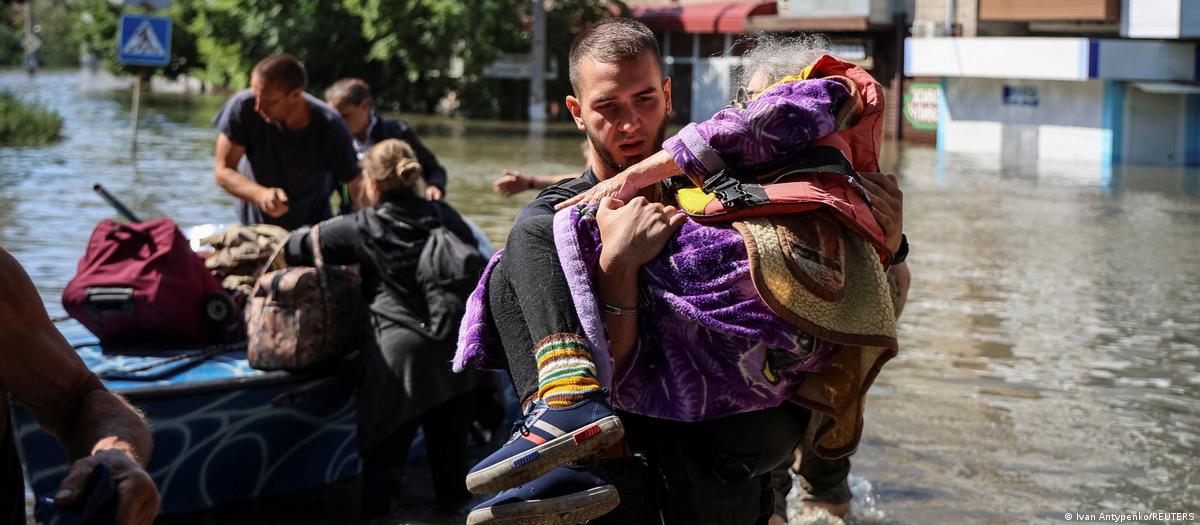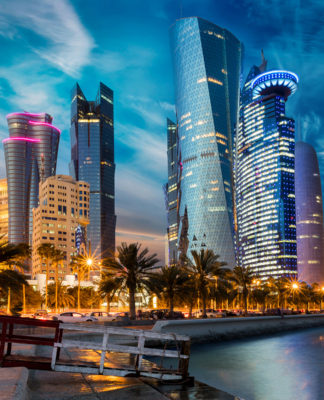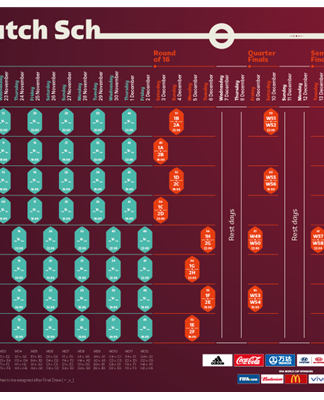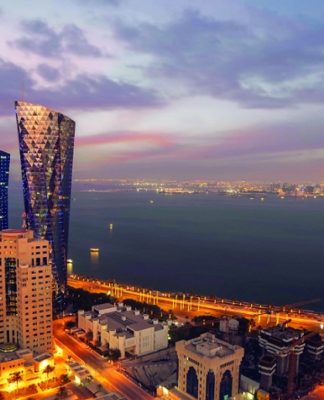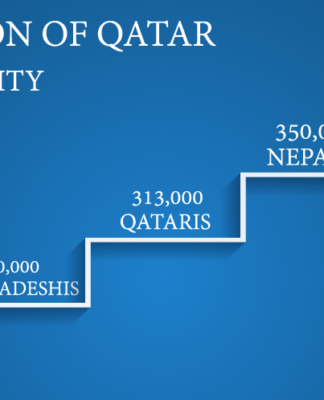Ukraine updates: Kakhovka dam flooding to immerse more areas
42 minutes ago42 minutes ago
Flooding in the Kherson region of Ukraine is forecast to continue for days after the destruction of the Kakhovka dam. DW has the latest.
https://p.dw.com/p/4SHRM
Security forces evacuate local residents from a flooded area after the Kakhovka dam breached
About 42,000 people were at risk from flooding in Russian and Ukrainian controlled areas along the Dnipro RiverImage: Ivan Antypenko/REUTERS
Water levels were expected to rise by another meter (about 3 feet) by Thursday following the destruction of the Kakhovka dam, Ukrainian authorities predicted.
While the flood’s force was expected to ease on Wednesday, the rise in water levels would engulf more downstream areas along the banks of the Dnieper.
Russian state media has reported that flooding could last up to 10 days in the Kherson region.
The Kakhovka dam collapsed on Tuesday. It remained unclear what caused it.
Ukrainian President Volodymyr Zelenskyy has accused Russia of deliberately destroying the dam, while the Kremlin has blamed Kyiv’s shelling for the breach.
“The destruction of one of the largest water reservoirs in Ukraine is absolutely deliberate … Hundreds of thousands of people have been left without normal access to drinking water,” Zelenskyy wrote on the Telegram messaging app.
Moscow-installed authorities have imposed a state of emergency in the Russian-annexed part of the region.
In the Ukrainian-controlled side of Kherson at least 1,582 houses have been flooded, and some 1,457 people have been evacuated overnight, governor, Oleksandr Prokudin, said.
Officials from Russia, Ukraine, and the UN have said that the damage will take days to assess and warned of a lengthy recovery period.
UN aid chief Martin Griffiths told the Security Council that the dam breach “will have grave and far-reaching consequences for thousands of people in southern Ukraine on both sides of the front line through the loss of homes, food, safe water, and livelihoods.”
“The sheer magnitude of the catastrophe will only become fully realized in the coming days,” he said.
Difficult evacuations in Ukraine: DW’s Max Zander reports
03:03
Here are some of the other developments concerning Russia’s war in Ukraine on Wednesday, June 7:
War in Ukraine and Ethiopia guarantees grim record in 2022
The number of people killed in wars and conflicts reached the highest number since the Rwandan genocide, the Uppsala Conflict Data Program found.
Researchers of the program at the University of Uppsala in Sweden said at least 237,000 people were killed in military conflicts in 2022.
Most fatalities were in Ukraine and Ethiopia, where at least 181,000 combat-related deaths were recorded.
Ukraine might have featured in headlines more but the civil war in Ethiopia between the Tigray People’s Liberation Front and the government was the bloodiest conflict of 2022.
More than 100,000 people were killed in Ethiopia in 2022, and more than 81,000 in Ukraine.
Russia to boost security at Zaporizhzhia for IAEA visit
Russian state-owned news agency TASS reported Moscow would take extensive security measures at the Zaporizhzhia nuclear power plant in Ukraine during a visit by International Atomic Energy Agency chief Rafael Grossi next week.
Grossi said he would travel to the plant following an attack on the Kakhovka hydroelectric dam.
The Kakhovka dam feeds a reservoir providing cooling water for the Russian-occupied Zaporizhzhia nuclear power station.
The IAEA said it saw “no short-term risk to nuclear safety and security” as “back-up options” were available.
UK Intelligence doesn’t foresee threat to Zaporizhzhia due to flooding
The Zaporizhzhia nuclear power plant is “highly unlikely to face immediate additional safety issues” due to the damage caused to the Kakhovka dam, the United Kingdom’s defense ministry said.
In their latest intelligence briefing on Twitter, the ministry said the dam’s structure would likely deteriorate further over the next few days, causing additional flooding.
The intelligence update stated water levels in the Kakhovka Reservoir were at a record high before the collapse.
China trade with Russia hits highest level since start of the war
China’s trade with Russia reached an all-time high of $20.5 billion (€19.2 billion) in May.
China has become Russia’s biggest export market and an important source of manufactured goods.
It has boosted its imports, especially energy, from Russia by 10% to $11.3 billion as Beijing capitalizes on price cuts.
Chinese exports to Russia surged 114% to $9.3 billion.
During a summit in March,Chinese President Xi Jinping and Russian leader Vladimir Putin pledged to boost trade to $200 billion in 2023 as they hailed their “no limits” partnership.
Western nations have criticized Beijing for not condemning Russia’s actions in Ukraine and for indirectly supporting its sanctions-hit ally.
Two Russian towns lose power in attack
Two towns in Russia’s western Kursk region lost electricity in an overnight attack, Roman Starovoy, the regional governor, said.
He claimed Ukraine dropped explosives on an electricity substation situated near the border.
“One of the workers received shrapnel wounds while restoring power supply. He is in the central district hospital, and doctors are giving him all necessary treatment,” Starovoy told the Reuters news agency.
Zelenskyy says Ukraine will not be stopped by Russia’s explosion of dam
Ukraine will not let the explosion of the Kakhovka dam stop it from reclaiming occupied territories, President Volodymyr Zelenskyy has said.
“The disaster caused by Russian terrorists at the Kakhovka hydroelectric power plant will not stop Ukraine and Ukrainians,” Zelenskyy said in his evening video message late on Tuesday. At the same time, he promised help to those affected in the flooded region.
According to Zelenskyy’s account, the blowing up of the dam was intended to slow down the Ukrainian counteroffensive. “We will still liberate our entire country,” he said. Such attacks could not prevent Russia’s defeat, he said, but would only lead to Moscow having to pay higher damages in the end.
The Ukrainian prosecutor general had already turned to the International Criminal Court (ICC) with a request for an investigation into the explosion, he said.
Meanwhile, Zelenskyy said the government was doing everything it could to rescue flood victims and provide the population with drinking water.
Russia ‘likely underestimated flood impact’
03:39
Russian forces shell ammonia pipeline in Ukraine’s Kharkiv region
Russian forces repeatedly fired at an ammonia pipeline in Ukraine’s Kharkiv region, a local governor said on Tuesday, a conduit potentially crucial for the extension of a deal allowing the safe export of grains and fertilizers from Black Sea ports.
The extension next month of the Black Sea Grain initiative, a pact struck in July 2022 to help stop global food prices rising, could hinge on the reopening of the pipeline.
The ammonia pipeline, the world’s longest, stretches about 2,470 kilometers (1,534 miles) from Russia’s Togliatti on the Volga River to three Black Sea ports. It has been shut down since Moscow’s invasion of Ukraine in February 2022.
There was no recorded leakage from the late Tuesday shelling that hit the pipeline near the village of Masiutivka and an overnight shelling near the village of Zapadne, said Oleh Syniehubov, the governor of Ukraine’s Kharkiv region.
lo,dh/msh (AP, AFP, dpa, Reuters)














